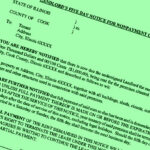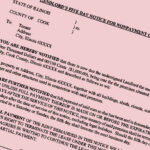 Don’t make these mistakes with the 5 Day Notice
Don’t make these mistakes with the 5 Day Notice
The five day notice for non-payment of rent (by the way, it is 10 days in Evanston, thank you very much) – it’s that “simple” little notice that is the beginning of many eviction cases. And boy can it mess up an Illinois eviction lawsuit if it is done wrong! Section 9-209 of the Illinois Forcible Entry and Detainer Act governs the “demand for rent” that must be provided in an action for possession. Most versions of the 5 day notice form that float around are pretty simple. However, many landlords and even some of their agents (who should know better) mess up the form with regularity. And, if the notice is wrong, the eviction case is unlikely to succeed.
Here at Reda | Ciprian | Magnone, LLC,




